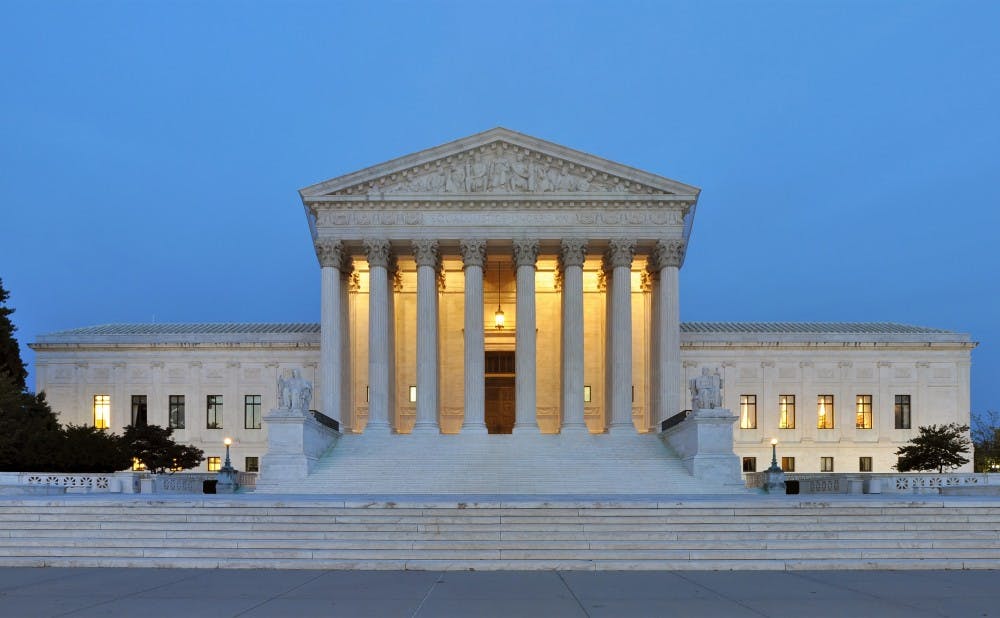The future of the redistricting process will be decided by the Supreme Court this term.
On Wednesday, the Supreme Court will hear oral arguments in Moore v. Harper to decide if the North Carolina Supreme Court has the authority to nullify the North Carolina General Assembly’s illegally gerrymandered congressional map for violating the state constitution.
The case has national implications. Beyond potentially changing the power that state legislatures have in drawing districts, election-related issues like early voting, mail-in ballots, and voter ID laws could all face changes depending on the outcome of this case.
On Feb. 4, the N.C. Supreme Court ruled along party lines in Harper v. Hall that the congressional map proposed by the N.C. General Assembly was “unconstitutional beyond a reasonable doubt” due to its gerrymandered nature. The map would have given Republicans 10 out of 14 congressional districts in 99.99% of possible maps despite North Carolina’s roughly even split in voter registration between the two major parties.
Eventually, a group of nonpartisan redistricting experts were charged with redrawing the map, which eventually resulted in a N.C. congressional delegation of seven Democrats and seven Republicans following the 2022 midterm elections.
Republican Timothy Moore, Speaker of the North Carolina House of Representatives, filed a petition for a writ of certiorari on Mar. 17 to ask the U.S. Supreme Court to review the case. The Supreme Court granted his petition on June 30. Moore’s case centers around Independent State Legislature Theory, a “once-obscure doctrine” supported by some conservatives.
The theory argues, based on a narrow reading of the Elections Clause of the Constitution, that state constitutions and courts have no power over federal elections. The theory can be traced back to a concurring opinion in Bush v. Gore in 2000 when the U.S. Supreme Court stopped a recount ordered by the Florida Supreme Court. Late justices William Rehnquist and Antonin Scalia and Justice Clarence Thomas agreed with the majority, but argued that the state legislature, not the state supreme court, should have the sole authority to order a recount in a presidential election.
The concurrence has been used unsuccessfully to attempt to challenge Arizona’s independent redistricting commission in 2015 and later, to overturn the results of the 2020 election. While the theory has “some credence” because it was cited in a concurrence, the opinion is not legally binding because it is not a majority opinion, according to Duke Law Professor Thomas Metzloff.
Metzloff expressed concerns about the theory’s validity, checks and balances, distribution of power and the future of elections.
He is interested to see how literally the Supreme Court will read the Constitution and the extent that it will respect constitutional principles such as checks and balances.
“You start with the words [of the Constitution], but then you have to look at them in context,” he said.
Metzloff expects tension between originalism, a viewpoint focusing on the meaning of the provisions at the time of the ratification of the Constitution, and others who value “evolution [of the meaning of the Constitution] in light of modern day realities.”
Regardless of how the justices rule, both sides would have to interpret the meaning of the words in the Elections Clause, since the redistricting at issue in Moore falls under this clause.
“The Supreme Court can read the clause pretty literally, but still not [say] that the state legislature gets to decide all of this,” said Metzloff.
Beyond redistricting, Metzloff believes a ruling in favor of the petitioner could affect voter ID requirements and other laws influencing elections.
“You have to be worried if the legislatures in some states are given more authority now without the ability to test those limits in state courts,” he said.
“If the petitioner wins, we're in kind of a whole brave new world. It's a little bit scary for some people,” said Metzloff. “It may not be as bad as everybody says, but there would be a lot more authority and power. I think some state legislatures, I'm not saying in North Carolina, but some, will probably feel pretty emboldened to take some steps that most of us would think are pretty drastic and anti-democratic.”
Metzloff expects at least Justices Ketanji Brown Jackson, Elena Kagan and Sonia Sotomayor, the three justices appointed by Democratic presidents, to rule against Moore.
Get The Chronicle straight to your inbox
Signup for our weekly newsletter. Cancel at any time.

